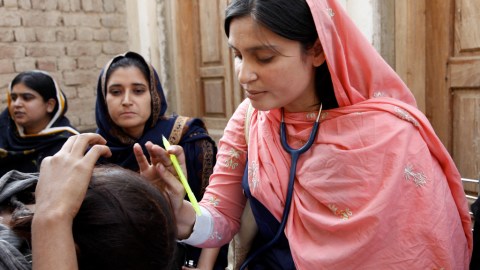The Medical Brain Drain

What is the Big Idea?
Zambia-born Kunj Desai is a doctor in Newark, NJ where his salary is nearly ten times that of what he gets paid back home. He practices medicine in modern facilities and utilizes sophisticated technology to treat his patients. This is a stark contrast to how Desai’s friend Emmanuel Makasa practices medicine in Zambia, where dirty scalpels litter the floor of his operating room and a Bosch power drill is the tool on deck for leg surgery.
“In a globalized economy, the countries that pay the most and offer the greatest chance for advancement tend to get the top talent,” according to a feature in The New York Times Magazine.
South America’s soccer players go to Europe for its salaries and glitzy tournaments. China and India’s high tech workers head for the United States for job oppotunities. This trend is also true in the medical field where enticing salaries and technology in the U.S. is now the “world’s most powerful magnet for doctors, attracting more every year than Britain, Canada and Australia — the next most popular destinations for migrating doctors — combined.”
Read the full New York Times Magazine article here.
What is the Significance?
Josh Ruxin, Big Think expert and founder of Rwanda Works, provides additional context from the other side of the Atlantic in a New York Times op-ed.
“Sixty percent of medical doctors who trained in Ghana in the 1980s have since left the country, and there are more Ethiopian doctors in Washington DC than in all of Ethiopia,” said Ruxin. “Sub-Saharan Africa today houses more than a tenth of the world’s population, and shoulders a quarter of the global burden of disease, but it has just three percent of the world’s health care workers.
Rwanda, where I live, has just one medical school for a growing population of nearly 11 million. Aspiring students face stiff competition for the limited number of spots available in the school –just 42 students will graduate this year – so many have no choice but to desert the dream of becoming a doctor or nurse altogether. The result is that medical capacity in Rwanda is severely limited, and many rural districts (with about 300,000 people per district) have fewer than a dozen full time medical doctors. Without a robust medical educational system that promises high pay for public health doctors, it’s hard to imagine how Rwanda will overcome its current situation.”
Health problems, however, transcend national borders and even the healthcare industry, according to Ruxin. By improving the health of people in poor countries, individuals as well as the world economy reaps the benefits.
“These are health issues which don’t just impact the communities in which they are occurring, it impacts the whole world. It makes everybody more susceptible to diseases, which we really don’t want to see at the levels of pandemic that we’ve seen just in the recent past,” said Ruxin.
Listen to Josh Ruxin talk about the importance of global health:





